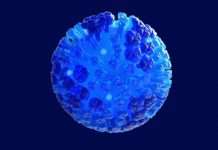
Oct. 13 (UPI) — The first case of COVID-19 reinfection in the United States occurred in a man with no known underlying health conditions to increase his risk for serious illness from the virus, according to a report published Monday by the The Lancet Infectious Diseases.
The 25-year-old was infected with two distinct genetic strains of the new coronavirus within 48 days after testing negative in-between. His second infection was more severe than the first, and the man required hospitalization with oxygen support, the researchers said.
The cases suggest that previous exposure to COVID-19 may not guarantee total immunity from the virus, according to the researchers.
“We don’t think this means that everyone who has been infected with the virus isn’t immune,” co-author Mark Pandori, of the Nevada State Public Health Laboratory at the University of Nevada, Reno School of Medicine, told UPI.
“It’s just that some people may not be, or that immunity may not last very long,” he said.
Nevada public health officials first reported the case of COVID-19 reinfection Aug. 29. At the time, it was the first known instance in which a person had two separate bouts with the virus, at least in the United States.
After testing positive for COVID-19 in April, the man tested negative for the virus on two separate occasions, before getting a positive result — after developing severe symptoms, including fever, headache, dizziness, cough, nausea and diarrhea — in June, Pandori and his colleagues said.
Researchers evaluated the genetic sequence of the virus from both April and June and found significant differences between the two cases.
He has since recovered from the second infection and was discharged from the hospital, they said.
A similar case was reported a few days earlier in Hong Kong, and others have since been documented in Belgium, the Netherlands and Ecuador. Meanwhile, doctors in Seattle reported a case of reinfection in September.
Only the Ecuador case, however, displayed worse disease symptoms during reinfection, according to Pandori and his colleagues.
It’s unclear why both the man in Nevada and the person in Ecuador developed worse symptoms the second time around, though it may be that the presence of antibodies to the virus caused more severe illness, Pandori and his colleagues theorized.
Antibodies are cells produced by the human immune system to fight off viruses.
Additional research into COVID-19 reinfections is needed, but the findings in the Nevada case suggest that even those who have been diagnosed with the virus should continue to take steps to reduce their risk, the researchers said.
“This is a dangerous, dangerous [virus], and our best weapons remain wearing a mask and practicing social distancing — and even people who have been infected should continue to take these precautions,” Pandori said.





